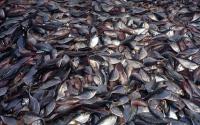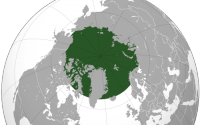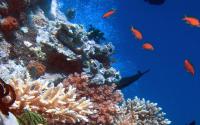Overfishing

Quicktabs: Keywords

On Thursday, five Arctic nations signed a declaration promising their fishing vessels will stay out of a 1.1 million-square-mile zone in the central Arctic Ocean, an area bigger than the Mediterranean Sea.
[ More ]
The high seas—the vast roiling ocean that reaches beyond a coastal states’ 320-kilometer exclusive economic zone, or EEZ—is Earth’s largest biosphere. It represents about 58 percent of our planet’s oceans and is mostly unexplored, exhaustively exploited and in rapid decline. That’s why there was cause for celebration a few weeks ago when, after a decade of hair-pulling discussions, national representatives at the United Nations finally agreed that the high seas need protection.
[ More ]
The Global Ocean Commission reported in late June that the ocean, the planet’s largest and least-protected bioregion, is close to collapse. The independent body, which includes former heads of state, government ministers, and ocean scientists, points to a perfect storm of escalating threats to the sea: overfishing, habitat loss, and pollution, as well as ocean acidification and warming due to climate change.
[ More ]
Ocean warming driven by climate change will reduce the amount of food reaching marine life on the seafloor, a recent study suggests. This would result in a 5.2 per cent global reduction in seafloor biomass by the end of the 21st century and biodiversity hotspots, such as cold-water coral reefs, will be particularly badly affected, say the researchers.
[ More ]
The United States and four other Arctic nations have tentatively agreed to prevent commercial fishing in the high Arctic.
[ More ]
The prospect of a race to the bottom of the ocean – a 21st-century high seas version of the Klondike gold rush – has alarmed scientists. The oceans, which make up 45% of the world’s surface, are already degraded by overfishing, industrial waste, plastic debris and climate change, which is altering their chemistry. Now comes a new extractive industry – and scientists say governments are not prepared.
[ More ]
U.S. officials are heading to Greenland for a three-day meeting to persuade other Arctic nations to place a moratorium on high-seas fishing in the Arctic Ocean, where climate change is melting the permanent ice cap and allowing trawlers in for the first time in human history.
[ More ]The Convention also maximizes legal certainty for United States sovereign rights over ocean resources in the largest EEZ in the world, as well as energy and mineral and other resources on our extended continental shelf. The Convention provides the mechanism to assure international recognition of additional United States sovereign rights on an extended continental shelf. Moreover, due to overfished and depleted fish populations, effective management of migratory fish stocks and fisheries will continue to be a contentious issue for the foreseeable future. The Convention is widely accepted as the legal framework under which all international fisheries are regulated and enforced. The Convention imposes responsibilities on the coastal states to manage their fishery resources responsibly and provides a process for resolving conflicts between competing users. The Coast Guard defends United States sovereign rights by protecting our precious ocean resources from poaching, unlawful incursion, and illegal exploitation. Joining the Convention places these sovereign rights on a firmer legal foundation, bolstering the Coast Guard’s continued ability to ensure our Nation’s sovereign rights are respected.
In particular, becoming a party to the Convention will give the Coast Guard greater leverage in our efforts to eliminate illegal, unreported, and unregulated fishing. American fishermen are currently abiding by standards contemplated by the Convention and further detailed in the related UN Fish Stocks Agreement. They are adversely affected by foreign fishermen who illegally harvest highly migratory fish stocks. In another anomalous situation, the United States is a party to the UN Fish Stocks Agreement, which is directly related to the legal regime of the Law of the Sea Convention, even though we have not joined the underlying Convention. As a party to the Convention, we would be in a stronger position to persuade other nations to abide by the UN Fish Stocks Agreement and other modern international standards of fisheries management and thus advance our Nation’s interests in this field.
As national governments debate the merits of joining UNCLOS III, international conflicts over fishing rights continue to develop throughout the world. Of particular note are: 1) disputes in the Spratly Islands of southeast Asia; 2) negotiations between Japan and South Korea over the Islets of Takeshima; 3) negotiations between China and South Korea involving shared waters; and 4) conflicts over conservation practices between Canada, Spain, and the United States. These disputes illustrate some of the issues that need to be settled to solve the overfishing problem. In each instance, agreements are being worked out in accordance with UNCLOS III. Unfortunately, although UNCLOS III provides the framework to begin resolving these disputes, a great deal of uncertainty surrounding international fishing regulation continues.n185 In many instances who has the power to dictate fishing rights and territory remains unclear.n186 In some cases, fishing practices that lead to unhealthy depletion of fish stocks continue unchecked.n187 In other instances, temporary solutions are implemented, but the future still is unknown. Widespread acceptance of UNCLOS III would provide the necessary structure to resolve these tenuous situations.
The effects of overfishing may be the most devastating in Canada.n221 As a result, Canada has made drastic decisions in an attempt to save the fish stocks. In the 1990s, the northern cod fishery off the Grand Banks near Canada collapsed.n222 Canada made the unpopular decision to close the fishery in an attempt to maintain sustainable fish stocks within its EEZ.
The decision focused attention on nations fishing the same stocks outside Canada's EEZ. The result was the socalled "turbot [cod] war," an open conflict with fishermen from outside Canada who were perceived to be contributing to the problems on the Grand Banks. In 1995, a Canadian vessel fired warning shots and impounded the "Estai," a Spanish fishing vessel operating on the Grand Banks off the coast of Newfoundland. In a discussion about the United States' ratification of UNCLOS III, U.S. Senator Claiborne Pell argued before the U.S. Senate that similar incidents could be avoided in the future if UNLCOS III gains widespread support:
Had Canada and Spain both been party to the Law of the Sea Convention, this dispute could have been settled without the firing of shots. Regrettably, such incidents are the result of the growing uncertainty that prevails with regard to high seas fisheries and will only be avoided if the Convention on the Law of the Sea becomes a widely recognized instrument on which ... to establish a lasting regime for those fisheries.
In another instance, Canada sparred with the United States over fishing rights. In 1994, Canada developed a plan to levy a $1100 fee on United States fishing vessels that travel along the 650mile Inside Passage from Puget Sound, Oregon and Washington to Alaska.n231 Senator Pell argued:
The State Department concluded that this transit fee was inconsistent with international law, and particularly with the transit rights guaranteed to vessels under customary international law and the Law of the Sea Convention. Had the United States and Canada both ratified the Law of the Sea Convention ... The Canadians might have been more hesitant to take the steps they did. In any event, the full force of the convention and the international community could have been brought to bear for a prompt resolution of the dispute.n232
Thus, according to Senator Pell, UNCLOS III could help the United States resolve its international conflicts over fishing.
UNCLOS III provisions played a key role in the resolution of a major conflict in the Central Bering Sea in 1994. n285 The problem arose in the mid1980s, when the vessels of several nations began to fish a stock of pollack in an area of the Central Bering Sea just outside the U.S. and Russian 200mile EEZs. n286 The fish stock was largely associated with the U.S. zone and its fisheries.n287 The international fishery grew quickly, with the annual harvest soon reaching 1.5 million metric tons or more.n288 American fishermen increasingly called on the U.S. government to control international fishing in the Central Bering Sea, also known as the "Bering Sea Donut Hole."n289 By 1991, negotiations began among the nations that used the fishery: Russia, Japan, South Korea, China, Taiwan, Poland, and the United States.n290 These nations debated over whether the United States and Russia had a special right to the stocks.n291 The result was the "Donut Hole Convention,"n292 which has been described as a "precautionary approach to stock management."n293 Ambassador Colson has argued that UNCLOS III did not hinder the Donut Hole agreement; in fact, "the Donut Hole Convention could not have been negotiated without the framework and foundation provided by the Law of the Sea Convention."n294 Among the requirements of the Donut Hole agreement is that fishing vessels must use realtime satellite positionfixing transmitters while in the Bering Sea so nations can ensure that vessels are there only to navigate to and from the fishing ground.n295 The agreement also provides for boarding and inspection of fishing vessels by any party, and it establishes procedures to "ensure that no fishing occurs in the Donut Hole except in accordance with sound conservation and management rules."n296 While the Donut Hole Convention was negotiated with UNCLOS III in mind,n297 according to Ambassador Colson, "the Law of the Sea Convention can help the Donut Hole Convention by providing an alternative enforcement mechanism to ensure than no vessel undertakes conduct in the Central Bering Sea contrary to the provisions of the Donut Hole Convention."n298 The dispute settlement provisions of UNCLOS III would enable the parties to "ensure enforcement of multilateral fishery conservation arrangements on the high seas ... The Law of the Sea dispute settlement option can act both as a deterrent and as a means to bring about final resolution should problems arise in the Donut Hole in the future."
Overfishing is a tremendous problem facing the world's oceans.n320 The problem is perpetuated by individual national conservation efforts.n321 Although aimed at curbing overfishing, these programs have little effect if they apply only to one nation. n322 Fish are a resource that knows no boundaries. A limit on fishing by one nation does nothing to stop overfishing by another nation that exploits the same fishery. It also can lead to international conflict, as is evidenced by the "cod war" between Iceland and the United Kingdom. Only a joint effort by the world's largest fishing nations can bring the problem under control.
UNCLOS III is not perfect. Still, it is the strongest comprehensive environmental law agreement ever created. Its provisions dealing with fisheries conservation and management stress cooperation and coordination. The Convention also provides a framework necessary to implement conservation and dispute settlement. These provisions are essential for the world to begin to solve the overfishing problem. For example, by legitimating the EEZ and other zones of control, the Convention actually encourages nations to work together. Nations must agree on boundaries and on conservation plans.
Widespread support of UNCLOS III is necessary to control overfishing. Even widespread support, however, is not enough if large fishing nations still do not adhere to the agreement. The United States and Canada have not yet ratified the convention. Without their support, the international agreement cannot be effective.
In addition to large deposits of Arctic oil, gas, and other natural minerals, the Arctic Ocean is connected to several significant breeding areas of fish stocks, which are anticipated to move farther north as an apparent result of changes in Arctic water temperatures. The National Oceanic and Atmospheric Administration has stated that this shift has been going on for the past 40 years, with some stocks nearly disappearing from U.S. waters as the fish “seem to be adapting to changing temperatures and finding places where their chances of survival are greater.”23 In fear of uncontrolled new developments, the North Pacific Fishery Management Council decided in 2009 to ban all commercial fishing in a 200,000-square-mile Arctic area, from the Bering Strait to the disputed U.S.-Canadian maritime border. As a reshifting of fish stocks takes place, increased fishing oppor- tunities are likely to result in disputes over quotas and fishing areas. The U.S. Coast Guard (USCG) is already patrolling the Bering Sea border with Russia, which has been the source of some tension because of overfishing and boundary disputes. Norwegian and Russian cooperation on fishing in the Barents Sea has generally been promoted as a positive example of border cooperation, but incidents between the Norwegian Coast Guard and Russian trawlers have occurred from time to time, such as the arrest of the Russian trawler Sapphire II for illegal dumping of fish in waters around Svalbard in late Sep- tember 2011. While the company owning the trawler was given a €57,000 fine, both Russian Foreign Minister Sergey Lavrov and Norwegian Foreign Minister Jonas Gahr Støre moved quickly to diffuse the issue and stress that there was “no conflict” between the countries regarding fisheries.24 With increased fishing activity in the Arctic, such issues are again likely to develop. At the same time, increased activity demands increased capacity from the national coast guards, as a large part of search-and-rescue activity revolves around fishing vessels.
Without venturing into the intricacies of how an RFMO for the Arctic Ocean might be established and operated, the point is that the United States, Russia, and the other Arctic states are familiar with the challenges of managing sustainable fisheries and the consequences of failing to act proactively. Furthermore, all eight Arctic states have ratified the Fish Stocks Agreement, a strong indication “that all eight states have already accepted the principles established by [UNCLOS] that includes the enforcement of regional fisheries agreements in the high seas.”92 In short, cooperation among the Arctic states, including Russia, seems more likely than conflict on fisheries issues. The real question may be whether those states allocate sufficient resources to the enforcement of whatever regime is put in place.
Not all Arctic resources are buried in the continental shelf. In the United States, fisheries and the seafood industry account for $30 billion domesti- cally, $12 billion in exports, and employ more than 100,000.38 In the southern Arctic region (Bering Sea and Gulf of Alaska), they are leading employers and sustain the indigenous people.39 World-class fisheries are found in the Barents and Bering seas, the Central North Atlantic off Greenland and Iceland, and the Newfoundland and Labrador seas off the coast of northeastern Canada.40 Regulating and monitoring these stocks in the Arctic are critical economically and strategically. If not protected, the fisheries would be decimated by overfishing. The 110th Congress stated that ‘‘the United States should initiate international discussions and take necessary steps with other Arctic nations to negotiate an agreement or agreements for managing migratory, trans-boundary, and straddling fish stocks in the Arctic Ocean and establishing a new international fisheries management organization or organizations for the region.’’41
The United States remains in a holding pattern. The North Pacific Fishery Management Council voted to close the Arctic to commercial fishing until it can be conducted sustainably, a management mechanism is developed, and we can implement an ecosystem-based management policy for Arctic resources.42 At some point, the United States cannot maintain this policy unilaterally and must enforce an international regime through patrolling and monitor- ing foreign fishing and fish-processing vessels in the region.
Pages
U.S. ratification of UNCLOS will boost efforts to manage fishing populations in multiple ways. First, UNCLOS provides a clear legal framework for resolving disputes between countries over fishing rights, as for example the disputes between the U.S. and Canada. Secondly, becoming a party to UNCLOS gives the U.S. Coast Guard more legal tools to enforce existing regulations within the U.S. EEZ. Finally, by aceeding to UNCLOS the U.S. will be able to better lead on cooperative solutions to the global problem of overfishing.
- Widespread acceptance of UNCLOS is necessary for it to be successful in resolving current overfishing disputes
- US interest in controlling overfishing is best served by becoming a party to UNCLOS
- US and Canadian ratification of UNCLOS necessary for its provisions on overfishing to be fully effective
- The Bering Sea "Donut Hole" convention to resolve overfishing disputes was based on and supported by UNCLOS
- ... and 8 more quote(s)
